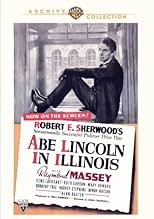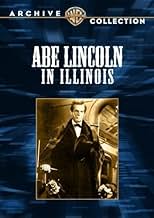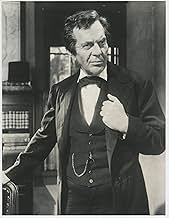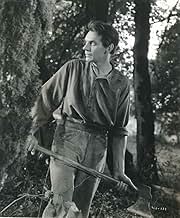CALIFICACIÓN DE IMDb
7.3/10
2.1 k
TU CALIFICACIÓN
Agrega una trama en tu idiomaHumble Abraham Lincoln gains the respect of his Illinois neighbors, growing in stature and respect until he is elected President in 1860 and departs for Washington.Humble Abraham Lincoln gains the respect of his Illinois neighbors, growing in stature and respect until he is elected President in 1860 and departs for Washington.Humble Abraham Lincoln gains the respect of his Illinois neighbors, growing in stature and respect until he is elected President in 1860 and departs for Washington.
- Nominado a 2 premios Óscar
- 2 nominaciones en total
Howard Da Silva
- Jack Armstrong
- (as Howard da Silva)
Argumento
¿Sabías que…?
- TriviaAfter his success playing Lincoln in the film and on Broadway, Raymond Massey began to assume the character in real life. He often appeared at social gatherings dressed in Lincoln-esque attire, assuming a Lincoln-like manner and speech. His friend, the playwright George S. Kaufman, observed, "Massey won't be satisfied until someone assassinates him."
- ErroresWhen results for the 1860 election are being received, West Virginia is listed on the the state-by-state tally board. West Virginia didn't become a state until 1863, when it broke off from Virginia after that state had seceded from the Union.
- Citas
Mentor Graham: Well, Abe, there are always two occupations open to those who have failed at everything else: school teaching and politics.
- ConexionesFeatured in History Brought to Life (1950)
- Bandas sonorasOld Abe Lincoln Came Out of the Wilderness
(uncredited)
Traditional
Sung by chorus over opening credits
Opinión destacada
I have seen this film probably 15 times or more and have been a devotee of the Lincoln mythology (for lack of a better term) for nearly 20 years. I remember first seeing the film as a youngster on the same weekend as the death and funeral of President Kennedy in November of 1963. At that time, the two scenes that struck me as most memorable to my young mind was the one where the local woman tells Lincoln that he is the homeliest man in the county; and, the other scene where Lincoln is telling the slightly off-color joke to a crowd about the man fighting the bear. Also, another visual that sticks in my memory is the somewhat haunting scene where Lincoln revisits New Salem after the once thriving city has become a ghost-town.
There are several marvelous aspects of this movie. To begin with, is the near perfect physical and emotional representation of Lincoln by Raymond Massey. Given the photographs of the pre-president Lincoln, making Massey into sixteenth president seems nearly ordained from the beginning. The height, facial structure, and body type is nearly a perfect fit. Regarding how Lincoln spoke, it is hard to determine if that is an accurate representation or not. Historical accounts of Lincoln says that he had a rather high and not necessarily soothing voice. Since, it would be another 30 plus years before there is any kind of recording device, Massey's voice should seem appropriate enough.
Additionally, the cinematography is excellent. The on-location or natural shots are superior by black and white standards. Even though I am a devotee of black and white films, color films seem to have the upper hand when filming wide-open or rustic environments. The feel of the indoor scenes such as the ones within the Lincoln Springfield home is nearly perfect for the times. You can virtually smell the cigar smoke or the burning wood stove. Finally, the lighting during the campaign speech scenes are awesome.
But, the best part of the movie is how even with some artistic license the characters surrounding Lincoln are historically strong and represent in a film microcosm a very accurate historical reality of Lincoln's early years. For example, starting with Ruth Gordon's portrayal of Mary Linoln Todd. With her character, you can easily feel how much she effected Lincoln. Her persistent pressure on Lincoln to achieve political importance and her hard-nose, sometimes loving, sometimes bitter prescience is from my historical reading just about perfect. Since the film takes place before Lincoln is actually president, Mary Todd Lincoln's shenanigans within the White House or her emotional unraveling in her later years is not an issue here.
The romance demonstrated between Lincoln and Ann Rutledge, although later to be historically challenged, then even later to be considered historically (possibly) significant, is quite sadly moving. It is nicely juxtaposition-ed against the image of Mary Lincoln Todd.
Howard De Silva as New Salem's local ruffian is although somewhat embellished, still represents Lincoln's ability to relate to people from all walks of life. The film just seems to find the vital essence of young Lincoln before he became president.
The surreal, final scene of Lincoln leaving Springfield for Washington D.C. (again although actually happening during the day during a rainstorm)after giving one of his many great historical speeches ("this is where I have lived") catches the eerie but profound feel of how important his leadership is going to mean to the struggling republic. The playing of the "Battle Hymnn of the Republic" although premature, is still simple perfect.
There are several marvelous aspects of this movie. To begin with, is the near perfect physical and emotional representation of Lincoln by Raymond Massey. Given the photographs of the pre-president Lincoln, making Massey into sixteenth president seems nearly ordained from the beginning. The height, facial structure, and body type is nearly a perfect fit. Regarding how Lincoln spoke, it is hard to determine if that is an accurate representation or not. Historical accounts of Lincoln says that he had a rather high and not necessarily soothing voice. Since, it would be another 30 plus years before there is any kind of recording device, Massey's voice should seem appropriate enough.
Additionally, the cinematography is excellent. The on-location or natural shots are superior by black and white standards. Even though I am a devotee of black and white films, color films seem to have the upper hand when filming wide-open or rustic environments. The feel of the indoor scenes such as the ones within the Lincoln Springfield home is nearly perfect for the times. You can virtually smell the cigar smoke or the burning wood stove. Finally, the lighting during the campaign speech scenes are awesome.
But, the best part of the movie is how even with some artistic license the characters surrounding Lincoln are historically strong and represent in a film microcosm a very accurate historical reality of Lincoln's early years. For example, starting with Ruth Gordon's portrayal of Mary Linoln Todd. With her character, you can easily feel how much she effected Lincoln. Her persistent pressure on Lincoln to achieve political importance and her hard-nose, sometimes loving, sometimes bitter prescience is from my historical reading just about perfect. Since the film takes place before Lincoln is actually president, Mary Todd Lincoln's shenanigans within the White House or her emotional unraveling in her later years is not an issue here.
The romance demonstrated between Lincoln and Ann Rutledge, although later to be historically challenged, then even later to be considered historically (possibly) significant, is quite sadly moving. It is nicely juxtaposition-ed against the image of Mary Lincoln Todd.
Howard De Silva as New Salem's local ruffian is although somewhat embellished, still represents Lincoln's ability to relate to people from all walks of life. The film just seems to find the vital essence of young Lincoln before he became president.
The surreal, final scene of Lincoln leaving Springfield for Washington D.C. (again although actually happening during the day during a rainstorm)after giving one of his many great historical speeches ("this is where I have lived") catches the eerie but profound feel of how important his leadership is going to mean to the struggling republic. The playing of the "Battle Hymnn of the Republic" although premature, is still simple perfect.
- allvnev
- 11 abr 2006
- Enlace permanente
Selecciones populares
Inicia sesión para calificar y agrega a la lista de videos para obtener recomendaciones personalizadas
- How long is Abe Lincoln in Illinois?Con tecnología de Alexa
Detalles
Taquilla
- Total en EE. UU. y Canadá
- USD 1,451,880
- Tiempo de ejecución1 hora 50 minutos
- Color
- Relación de aspecto
- 1.37 : 1
Contribuir a esta página
Sugiere una edición o agrega el contenido que falta

Principales brechas de datos
By what name was El libertador (1940) officially released in India in English?
Responda




































